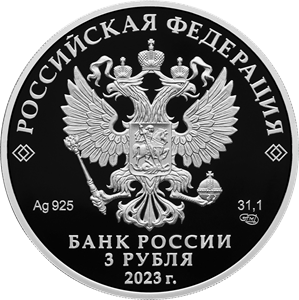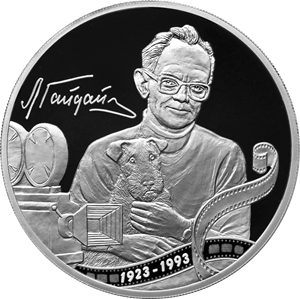Leonid Gaidai’s Creative Work
Obverse
a relief image of the National Coat of Arms of the Russian Federation, above it along the rim the inscription in a semicircle ‘РОССИЙСКАЯ ФЕДЕРАЦИЯ’ (RUSSIAN FEDERATION) framed with paired diamonds on both sides, under the coat of arms are the chemical symbol and fineness of the metal on the left and fine metal content and the mint mark on the right, at the bottom centre in three lines are the inscription ‘БАНК РОССИИ’ (BANK OF RUSSIA), the coin denomination ‘3 РУБЛЯ’ (3 RUBLES), and the year of issue ‘2023 г.’ (2023).
Reverse
features images of a portrait of Leonid Gaidai with his beloved pet in his arms, a film camera and a motion picture film strip, the years of the director’s birth and death ‘1923–1993’, and the facsimile of his signature. All the design elements are cast in relief, and the part of the film strip with images is laser treated for matte finishing.
Authors
Designers: E.V. Kramskaya (obverse), S.V. Sutyagin (reverse).
Sculptor: A.A. Dolgopolova (obverse, reverse).
Mint: Saint Petersburg Mint (СПМД).
Edge: 300 corrugations.
Discover more
Leonid Gaidai (1923–1993) was an outstanding Soviet and Russian film director, screenwriter and actor. He was awarded the title ‘People’s Artist of the USSR’, the Vasilyev Brothers State Prize of the RSFSR, and the title ‘Honoured Artist of the RSFSR’. He was a participant in the Great Patriotic War.
Leonid Gaidai’s films are masterpieces of national cinematography. His comedies are admired by the audience for timeless sparkling humour. Each of Gaidai’s films is a collection of vivid characters, talented performance, and catchphrases that instantaneously became popular among people.
His comedies Dog Barbos and Unusual Cross, Bootleggers, Operation Y and Shurik’s Other Adventures, Prisoner of the Caucasus, The Diamond Arm, Ivan Vasilievich Changes Profession, The Twelve Chairs, and It Can’t Be! are masterpieces that have become popular among many generations and have no linguistic barriers.
During the first year after the release, Gaidai’s films were viewed by over 500 million people. This is a remarkable result in the history of the Soviet and Russian cinematography.
The information is copyright protected.


